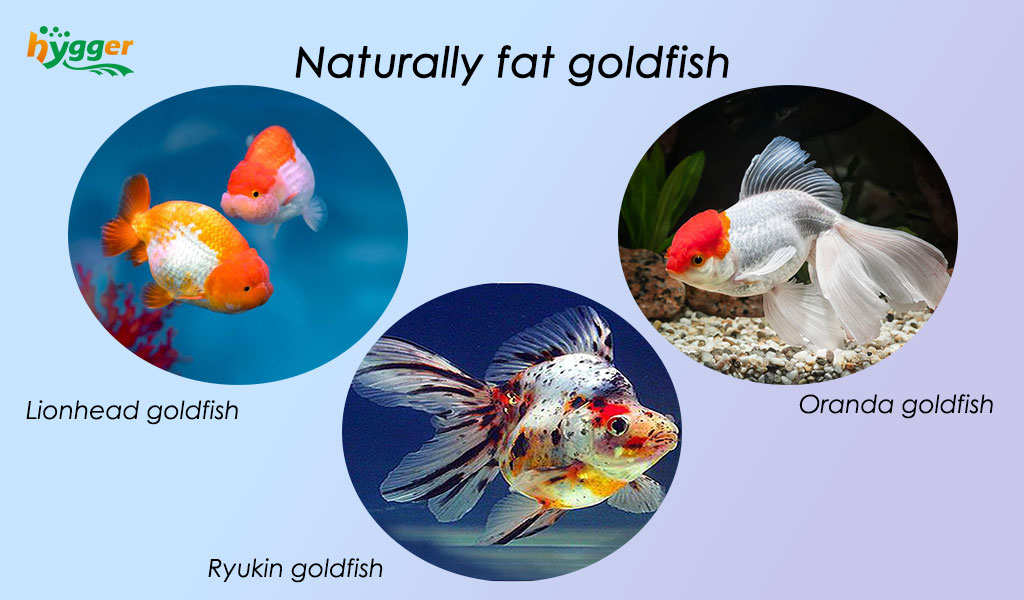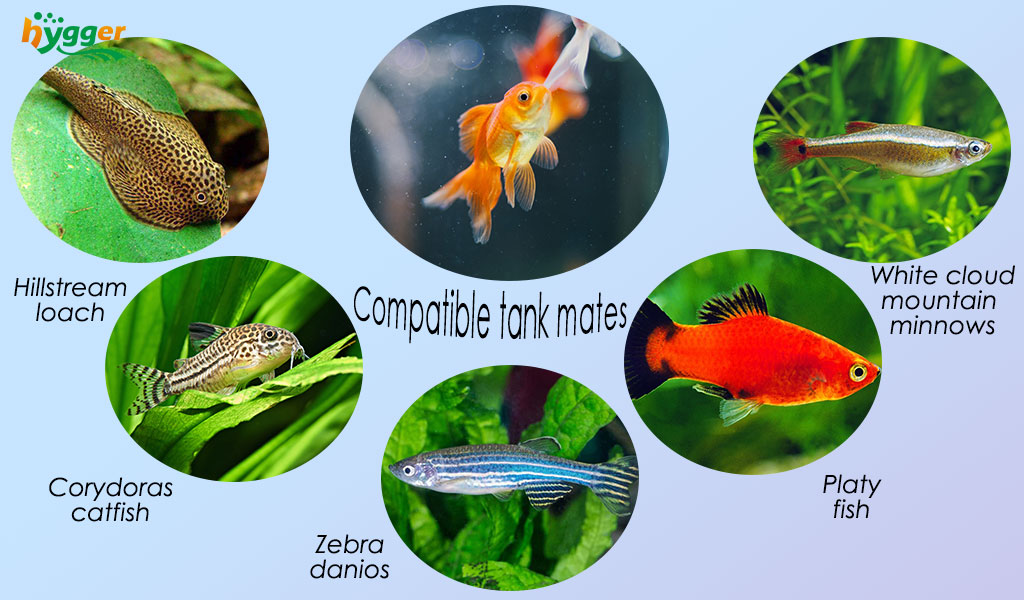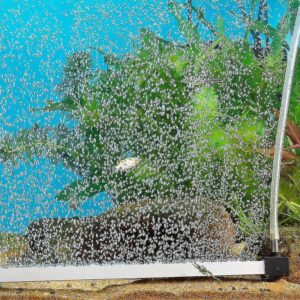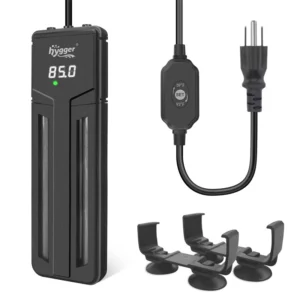As one of the freshwater ornamental goldfish, fat goldfish features a unique appearance. They are usually naturally fat. Also, fat goldfish can grow well with proper care. In today’s article, we will share how to care for fat goldfish and how many fat goldfish are in the aquarium. Without further ado, let’s dive in.
Content Table
Fat Goldfish
Fat goldfish are not a separate species. Featuring a rounded body, fat goldfish are also called chubby goldfish or jumbo goldfish. Next, we will list some naturally fat goldfish, such as Ryukin goldfish, Oranda goldfish, Lion head goldfish, Ranchu goldfish, and Bubble eye goldfish.
| Naturally fat goldfish | Ryukin goldfish | Oranda goldfish | Lion head goldfish |
| Family | Cyprinidae | Cyprinidae | Cyprinidae |
| Temper | Peaceful with semi-aggressive | Peaceful | Peaceful |
| Adult Size | 6–8 inches | 8–12 inches | 5–8 inches |
| Lifespan | 10–15 years | 8–15 years | 10–15 years |
| Diet | Omnivore | Omnivore | Omnivore |
| Min tank size | 10 gallons | 20–30 gallons | 10 gallons |
How Do Tell If the Fat Goldfish Is Healthy
Commonly, you can tell whether fat goldfish is healthy or not according to fish behavior. The table below gives you some pointers.
| Normal behavior (healthy fat goldfish) | Abnormal behavior (unhealthy fat goldfish) |
| 1. Active & Swim and explore in the tank | 1. Lethargy |
| 2. Eat regularly and have a great appetite | 2. Loss of appetite |
| 3. Search for food at the substrate | 3. Stay at the bottom of the tank |
| 4. Gasp air on the water surface | |
| 5. Clamped fins | |
| 6. Constant hiding | |
| 7. Abnormal swimming (e.g. swimming upside down) |
Take Care of Fat Goldfish
Requirements of living environment
Though fat goldfish possess great adaptability, they are sensitive to sudden changes in living conditions. Plus, adult goldfish can survive in slightly acidic or alkaline and even neutral aquarium water. But they do best in slightly alkaline water. Below are some general living environment requirements for most fat goldfish.
- Ideal water temperature: 65-75℉
- pH level: 6.5-7.5
- Ammonia level: 0 ppm
- Nitrite level: 0 ppm
- Nitrate level: Less than 40 ppm
- Hiding places: Necessary. Fat goldfish prefer to hide. For instance, hiding in rocks, caves, or aquatic plants.
- Tank size: You should keep fat goldfish in a 20-gallon tank at least.

Equipment to help keep the fat goldfish better
- Filter the water
Fat goldfish produce a lot of waste, thus, adding a great aquarium filter is necessary. Otherwise, your aquarium would get trapped in harmful conditions.
- Keep the aquarium water warm
As mentioned above, fat goldfish fancy a water temp ranging from 65℉ to 75℉. And they are sensitive to sudden and frequent water fluctuation. Hence, it is better to add an aquarium heater, which is helpful to keep consistent and stable water temperatures in your tanks.
- Maintain sufficient oxygen
To keep fat goldfish healthy, it is vital to maintain sufficient oxygen in the tank. In this case, adding an air pump is a great choice. It is beneficial to oxygenate aquarium water and expel excess carbon dioxide. Alternatively, an aeration strip kit is another excellent alternative. It can form a bubble curtain in your tank, while it can also improve the oxygen level.
Compatible tank mates
Most fat goldfish are peaceful, hence, it is feasible to keep them with other fish species. For example, you can keep Oranda goldfish, Ryukin goldfish, Lion head goldfish, Dragon eye goldfish, and Butterfly tail goldfish together. Aside from that, you can also keep fat goldfish with some tropical fish, such as White cloud mountain minnows, Platy fish, Zebra danios, Corydoras catfish, and Hill stream loach.

Fat goldfish diet
Fat goldfish are omnivores. The available food includes flakes, pellets, vegetables, brine shrimp, and other live or frozen food. Keep in mind – that they need a variety of food and a balanced diet but never overfeed. Otherwise, it would lead to health issues. So, you’d better feed fat goldfish regularly and quantitatively. The following are some tips about how often and how much to feed fat goldfish:
- Young fat goldfish: Feed them twice each day & make sure the goldfish will finish eating within 5 minutes
- Adult fat goldfish: Feed them once per day & make sure the goldfish will finish eating within 10 minutes
Daily maintenance
Clean water is critically crucial for fat goldfish. Do regular water changes and cleaning. For instance, change 30-50 percent of the water once per week. You can do it easily with the help of the gravel cleaner. A multi-function gravel vacuum cleaner can be used for water changes, fish gravel cleaning, and sand washing.
How Many Fat Goldfish Are in a 30-Gallon Aquarium
Leaving adequate room for fat goldfish to swim in your tank is necessary. Generally, the minimum tank size for one fat goldfish can be 20 gallons. For one additional fish, your tank should be 10 gallons larger than before. Next, we will cover some examples. Just take them as a reference.
| Tank size | Recommended fat goldfish density |
| 20 gallons | A single-fat goldfish |
| 30 gallons | 1-2 fat goldfish |
| 40 gallons | 2-3 fat goldfish |
| 50 gallons | 2-4 fat goldfish |
| 75 gallons | 3-5 fat goldfish |
| 100 gallons | 5-8 fat goldfish |
Summary
In addition to naturally fat goldfish, other factors will make the goldfish chubby. For example, overfeeding, overcrowding, and poor water quality. As the goldfish get obese, it would lead to health problems, like swim bladder disorder, difficulty breathing, heart failure, decreased immunity, etc.
Learn more about goldfish
- How Long Do Goldfish Live
- Best Aquarium Supplies for Goldfish
- How to Know if Goldfish is Egg Belly or the Start of Bloat


Leave a comment